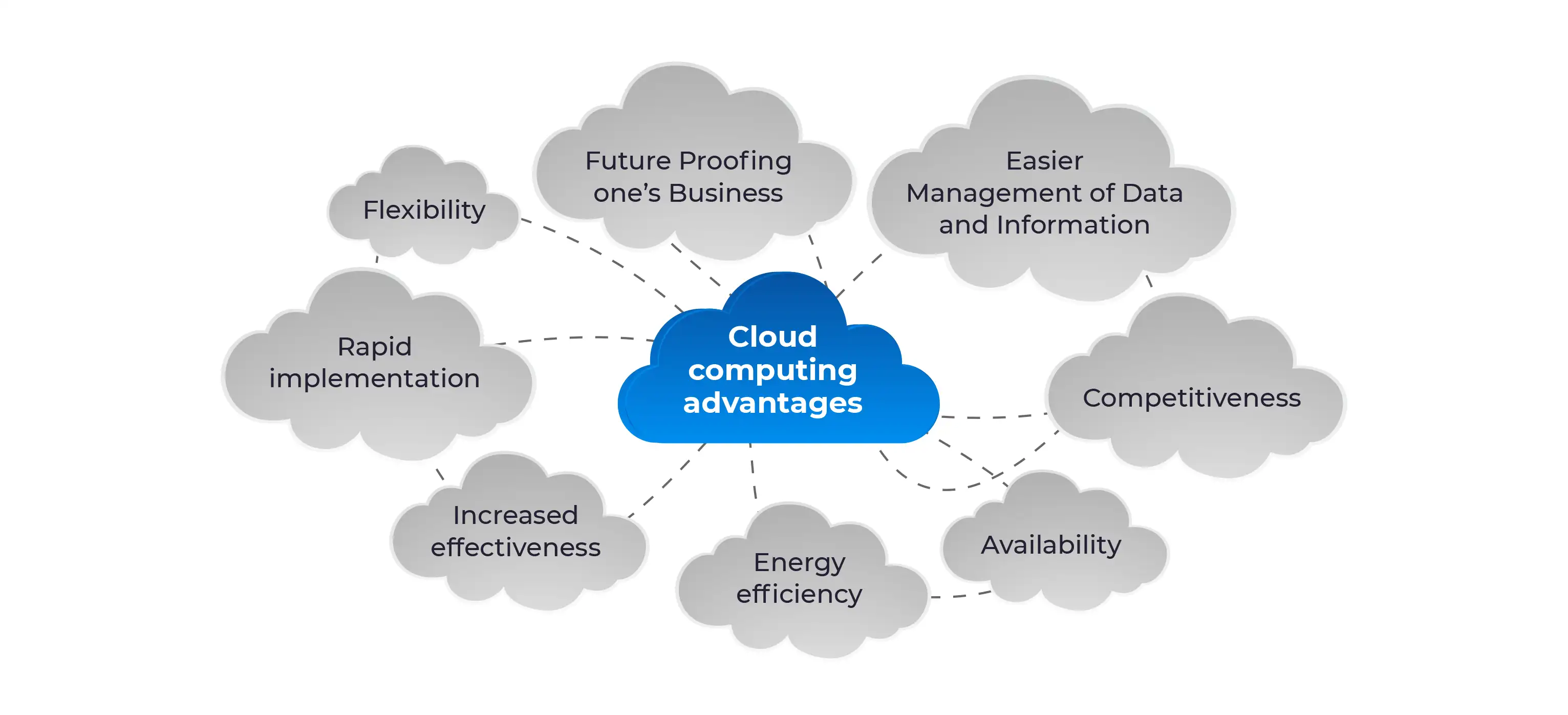 Jon Baleva
Jan 25, 2024
Jon Baleva
Jan 25, 2024

To comprehend the advantages of cloud computing, it is necessary to first understand the fundamental words associated with cloud computing.
Historically, the term cloud has been used as a metaphor for the Internet. This usage arose from its popular depiction in network diagrams as an outline of a cloud, used to indicate data transfer through carrier backbones (which controlled the cloud) to an endpoint location on the opposite side of the cloud. Professor John McCarthy proposed in 1961 that computer time-sharing technology could lead to a future in which computing power and even specific programs could be marketed through a utility-type business model.
This concept was popular in the late 1960s, but by the mid-1970s, it was evident that the IT-related technologies of the time were incapable of supporting such a futuristic computer architecture. However, the concept has been revived since the millennium's turn. The term "cloud computing" first appeared in technical circles during this period of rejuvenation.
Read Also: What is Cloud Computing and How Does It Work?
Utility computing is the provision of computational and storage resources as a metered service, similar to that of a traditional public utility business. This, of course, is not a novel concept. However, as organizations have begun to extend the model to a cloud computing paradigm, providing virtual servers that IT departments and consumers can access on demand, this type of computing is gaining popularity. Utility computing was first utilized mostly for non-mission-critical needs by early enterprise adopters, but this is rapidly changing as trust and reliability issues are addressed. Some believe that cloud computing is the next big thing in IT. Others say it is simply another iteration of the utility computing approach that has been sold as something new and hip in this decade. However, it is not simply the buzzword "cloud computing" that is perplexing the general public.
With so few cloud computing manufacturers actually using this technology and practically every analyst from every research group in the country defining the phrase differently, the term's definition has become exceedingly ambiguous. Even among those who believe they understand it, definitions vary, and most are vague at best. To help you grasp what cloud computing truly means, how disruptive it may become to your business in the future, and what its pros and cons are, this book will attempt to clear the haze and make some sense of the new notion.
Read Also: Cloud Computing Skills
For many businesses, the primary advantage of cloud computing is that it transforms IT from a capital-intensive problem to a pay-as-you-go activity in which operating expenditures track usage — and ideally compute expenses to match revenue.
Cloud Computing courses will give you an in-depth understanding of cloud services such as AWS Cloud formation, Microsoft Azure, Google Cloud, and other Cloud Computing courses. Aside from the strategic capital investment to operational expense shift, there are further advantages to cloud computing.
Cloud computing's rapid elasticity enables resources engaged for an application to rapidly grow and then decrease to match the actual workload, allowing cloud customers to better serve customer demand without incurring the financial risks involved with precisely predicting future demand.
Read Also: Cloud Computing Job Outlook
Before launching new apps or handling higher workloads, cloud consumers no longer need to acquire, install, and bring into service new computing power. Instead, businesses can simply purchase the required computer capacity "off the shelf" from cloud service providers, simplifying and shortening the service implementation cycle.
Read Also: Tips for Passing AWS Certifications Exams
Cloud computing allows cloud users to focus their limited resources on developing services to solve enterprise challenges rather than investing in constructing and maintaining computing infrastructure, enhancing organizational effectiveness.
Cloud service providers have the scale and infrastructure required to enable successful resource sharing among a community of cloud users for computing, storage, networking, and data center resources. This minimizes not just the total number of servers required when compared to dedicated IT resources, but also the associated power, cooling, and floor area consumption. In essence, intelligent cloud computing infrastructure sharing allows for greater resource utilization from a smaller total pool of resources than dedicated IT resources for each individual cloud customer.
Read Also: Top Cloud Gaming Jobs
Working from home or anywhere in the globe is possible with a good internet connection from a cellphone or laptop. One can quickly check the status of jobs completed by other employees and meet deadlines. Furthermore, things can be accomplished using cutting-edge technology and software.
Cloud computing provides small businesses with access to enterprise-class technology, allowing them to act faster than many large, well-established competitors.
Read Also: Types of Cloud Computing Service
Because data is centralized, it gives a more ordered structure for data management. Furthermore, tracking all transactions allows management to track employees' activity.
Cloud computing ensures that organizations are running the most recent version of their software. It is critical, especially given that more and more businesses are shifting to cloud services.
Read Also: Top Cloud Computing Certifications
Overall, we can argue that cloud computing can benefit small firms in terms of cost, security, scalability, energy usage, environmental friendliness, and competitiveness. Moving to the cloud can also assist businesses that choose to outsource IT tasks such as maintenance, provisioning, backup, and recovery, resources for peak demand, storage, and ensuring a high uptime percentage. Businesses with sensitive information that want complete control over their data, its location, and the protocols it goes through, as well as businesses where security is critical, should build their own data centers. Finally, migrating to the cloud is thought to be useless for major organizations with tailored data centers for their business needs.
Read Also: How To Prepare Your IT Team For Cloud Computing Developments?

SENIOR TRAINER: NETWORKING AND PROGRAMMING
Jon Baleva is an IT professional with 20 years of experience in programming and networking. He is an expert in Python & IT Security domains as well as in Operating Systems (OS). He has trained professionals and students in IT Programming courses, Microsoft Azure, Linux & MAC OS. He is also a writer who writes on tech-related topics for various tech magazines in Philippine. He is now an IT Trainer with Edoxi Training Institute, Dubai.